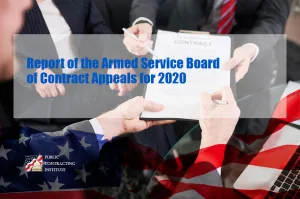Report of the Armed Service Board of Contract Appeals for 2020
On October 27, 2020, the Armed Services Board of Contract Appeals (“ASBCA” or “Board”) released its report on transactions and proceedings for fiscal year (“FY”) 2020. The report is interesting for its discussion, rather than the actual the case count.
A total of 497 cases were docketed in FY 2020. Although this was higher than the 418 cases for the previous year it was not as large a number as in FY 16 and FY 17.
A total of 363 cases were disposed of in FY 2020, of which 240 were dismissed. The Board noted that in the majority of the dismissals, the parties reached settlement. There were 123 cases disposed on the merits, of which 65 (53%) were sustained in whole or in part and 58 were denied. In October 2020, 947 cases were pending on the docket.

The Board held only 15 hearings for a total of 32 days. A total of 32 cases were voluntarily diverted from the regular trial docket to the Board’s Alternative Dispute Resolution (“ADR”) program.
In FY 2020, the U.S. Court of Appeals for the Federal Circuit docketed 8 appeals from Board decisions and disposed of 16 appeals involving ASBCA decisions. Of those, 13 were affirmed, one was reversed and remanded and two were dismissed.
The Board discussed the impact of the COVID-19 pandemic, noting that all of the Board’s employees began working remotely on March 12th and most employees continue to work remotely. This was made possible through a new electronic case management system, and the employees’ ability to adapt quickly to the new software and the remote working environment.
The principal areas of the Board’s workload that have declined were hearings and ADRs. Even though the Board developed a capability to conduct such proceedings remotely, litigants have pushed them forward into the future, presumably in the hope the proceedings could soon be conducted in person. However, because the pandemic persisted, the Board is beginning to receive requests for and begin conducting remote hearings and ADRs, in which the Board expects a significant upward trend during FY 2021.
Additional Information:
Key Takeaways from the Armed Service Board of Contract Appeals Report
Contract Appeals Insights: Reviewing the ASBCA Report for 2020
For other helpful suggestions on government contracting, visit:
Richard D. Lieberman’s FAR Consulting & Training at https://www.richarddlieberman.com/, and Mistakes in Government Contracting at https://richarddlieberman.wixsite.com/mistakes.
Copyright 2021 Richard D. Lieberman, Consultant & Retired Attorney



